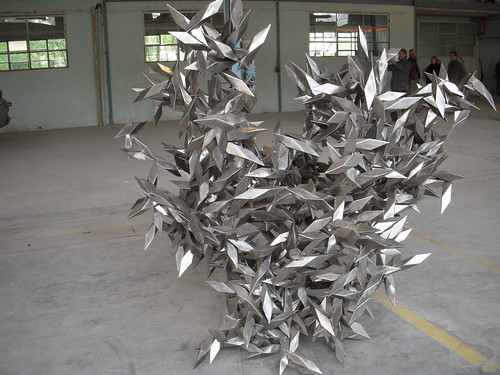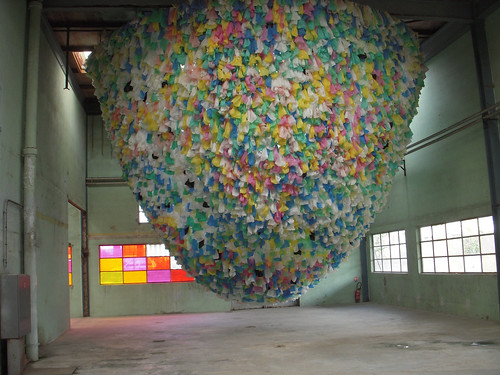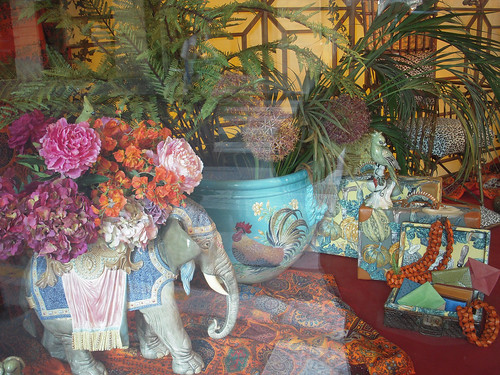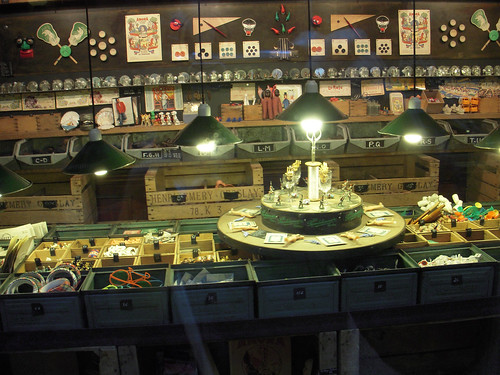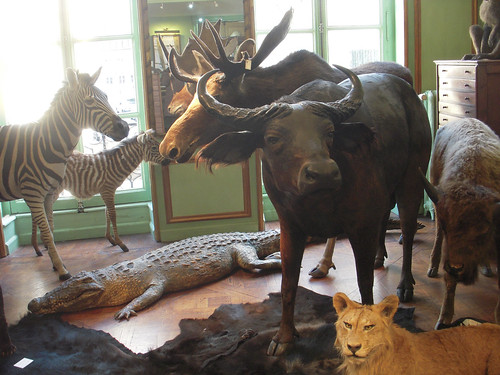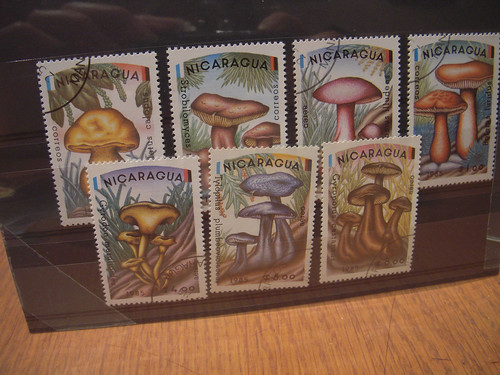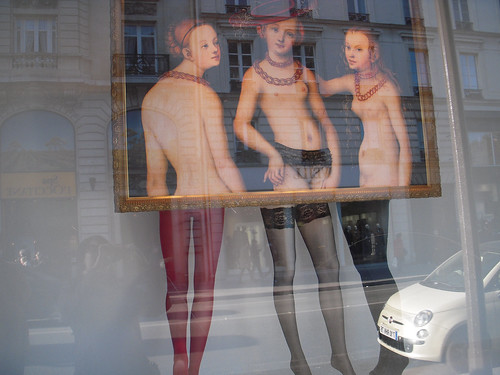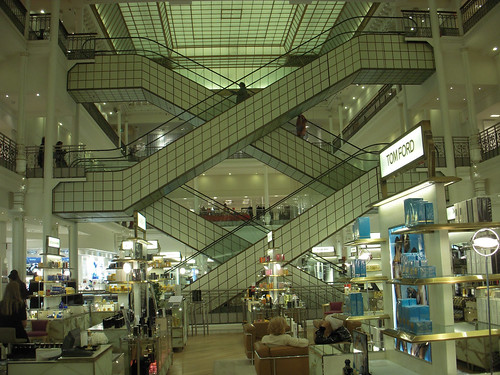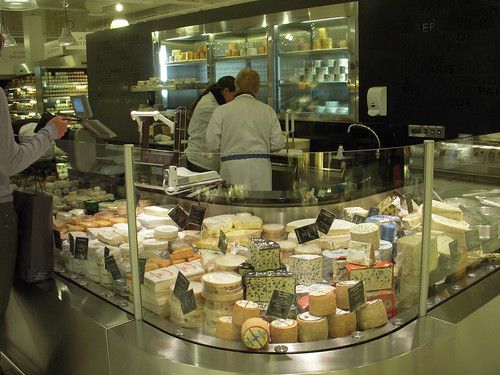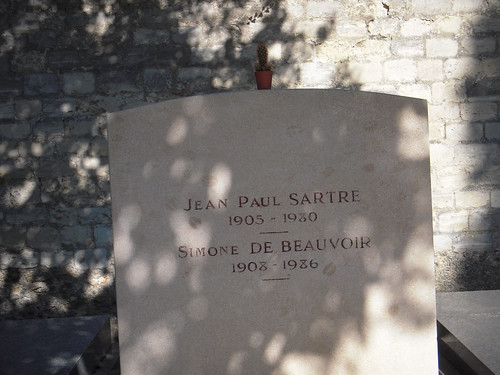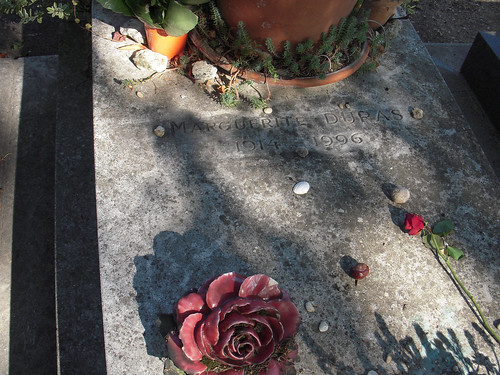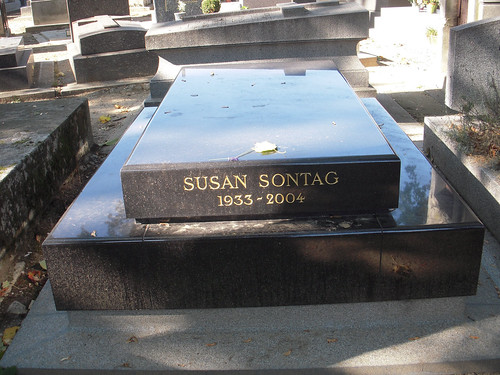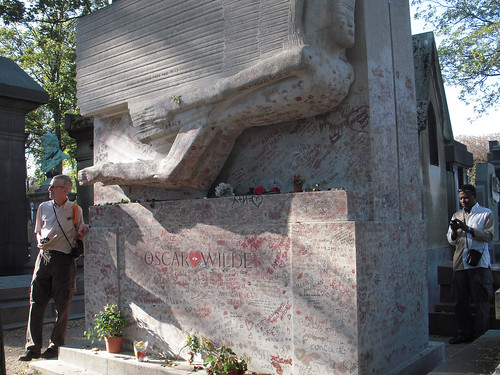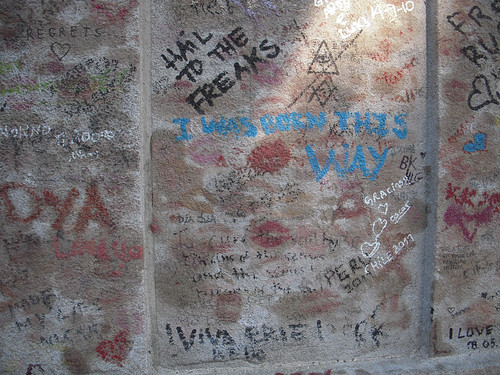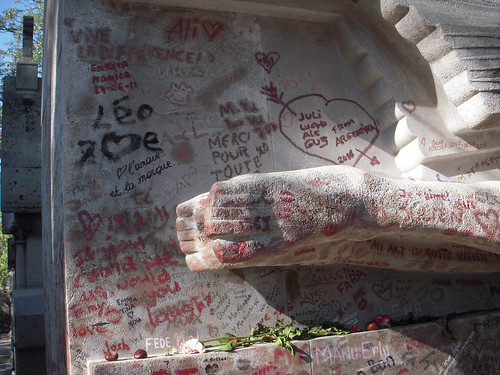Reading over my previous posts, I realize I'm a bit of a whiner. "Bitch, you are IN PARIS. Act like it!" is, in fact, the first thing that came to mind after reading my last entry. So this week I am now acting like I am in Paris. I began by having the week off from classes (how French is that?), leaving me with ample free time to catch up on my reading and attend some art shows. This week, among other books, I've been reading Rebecca Solnit's A Field Guide to Getting Lost, which I thought would be an appropriate collection of essays for a year in which I myself hope to get lost--figuratively, if not literally, in my experiences here. The second thing I did this past week was to attend FIAC: an international contemporary arts fair in which 168 galleries from around the world gather at the Grand Palais to show off their wares. There were also some free art installations and videos around the Tuileries and the Jardin des Plants as well, so that those who couldn't afford the hefty 32 euro entry fee into the Palais could still get something out of this grand exposition.
As I was walking around the art fair, taking in the various canvases and art installations, I was thinking about Paris's long and illustrious history as a center of art, and was struck by something. A lot of the contemporary art in Paris galleries that I've seen so far seems, well, not very good. Not nearly as good as some of the contemporary work I've come across in LA or New York or even London. This puzzled me, as the museums here are fantastic, but the continued cultural production of art--the art on the ground, say--seems curiously out of date. This isn't to say that it isn't intriguing or occasionally even beautiful, it's just not terribly inspiring.
The second thing I thought was that it might be because contemporary artists in Paris are being buried by their competition. From the shop window dressers.
It's a cliché, I know, to say that the French are some of the most aesthetically motivated people on the planet. Still, one of the many things that makes Paris an endlessly fascinating city is all the ways that beauty works its way into people's everyday lives. It's not just the museums, the food, the architecture, the clothing; in other words, beauty that might be found in isolated moments that a consumer would actively seek out or purchase. A lot of this beauty is free or at least passively intersects these isolated moments. For instance, walking in Paris is as much about looking at what the people are wearing on the street, and gazing at the objects inside the shop window, gazing too at the display of the objects in the shop window, as it is about the architecture and sculptures of the city itself: the more self-consciously "artistic" contributions of civic life. The city seems to have cultivated a certain "seamlessness" between what is inside the gallery space and what is outside of it, what is purchasable and what is simply part of being alive, offered gratis to the casual viewer with or without money, but possessed of the willingness to really look and be present in the city.
For instance, you might go to Deyrolle to look at its amazing displays of every stuffed mammal and sea creature and insect in existence.
Or you could stop off at Sadaharu Aoki's Japanese-inspired patisseries and eat a yuzu tart.
Or you could wander past any one of Paris's thousand florist shops.
Or you might wander into the stamp collector's gallery near Rue Montmartre, and find some colorful stamps from Nicaragua for 3 euros.
(I know what you're thinking. It's the same thing I thought when I found these stamps. "Holy shit: I want to go to NICARAGUA!")
Or you could go to the myriad small parks around town, as I did a few days ago, walking the length of an old train trestle near the Bastille that was turned into a garden promenade.
This "seamlessness" which is, for me at least, quite charming, is something that seems to have caused some architectural concerns for some Parisians, if the billboard I read the other day is any indication. On a long white billboard that was meant also to act as a visual barricade for the reconstruction taking place behind it, was a quote from a Parisian architect (name I forgot: sorry) that said, essentially translated (and crudely remembered): "Paris is not a museum. We cannot limit our vision to the preservation of the past, but must continue to build structures that will keep Paris a capital of the modern world."
This was, interestingly, a billboard for the rebuilding of the new Samaritaine grand magasin.
The museum-like quality to Paris does not mean that everything is static or held to the same aesthetic ideal, and it certainly doesn't mean that looking is free, or at least financially "capped" at a small entry fee. Living in or even visiting Paris requires money, and "simply" looking inevitably leads to wanting, and wanting inevitably leads to handing over your rapidly thinning wallet to a shopkeeper. At some point looking in Paris is NOT free: it still comes with a cost, even if that cost is the pain of an unsanitary apartment in the 11th arrondisement, and one's own perpetually unsatisfiable desires.
One thing that struck me while wandering around the Palais this weekend was just how much Paris was all about this connection between art and commerce. While the galleries at FIAC seemed interested primarily in shocking viewers into stopping and "shopping" through either crude, absurd or deliberately UNartistic images, the Paris shop window invites the viewer to take part in a more conventionally sensuous experience, one that is both playful as well as visually satisfying. And yet the Paris shop window knows that it, too, is using a highly refined aesthetic to appeal to the gazer's consumerist sensibility. But, unlike FIAC, at least the Paris shop window has a good sense of humor about it.
In fact, the longer I spent at FIAC, the less interested I became in the art, and the more interested I became in the space that housed the art, and the people who were marketing and collecting and looking at the art: all things that seemed, in their way, to be far more artfully engaged than the "art" itself.
It also filled me with longing for the afternoon I spent at the Bon Marché where I had my usual aesthetic breakdown in the food pavilion.
Somewhere after I purchased the perfectly wrapped, perfectly shaped citron tartelette with meringue, after I drank the mint tea poured into its tiny white porcelain cup and wandered past the freshly buffed chrome cheese cave with the shopkeepers in their crisp aprons, then past the artfully arranged aisles of biscuits and dried fruit and pastas, on to the gourmet-inspired pre-made meals ready to purchase and eat on the sidewalk if I wished, I hit the fruit and vegetable displays. And there, dear reader, I lost it.
Because there, before my eyes, were the most delicious piles of bright red and pale green apples, the most tantalizing little half-pints of fresh raspberries, stacks of radishes and butter lettuce and fresh spinach, some sort of yam-sized root vegetable the color of arterial blood, butter-yellow and knuckle-sized cooking potatoes, cherry tomatoes cradled in plastic boxes, and a whole row of vegetables and lettuces being gently bathed with a rolling spray of mist more like the steam off a distant waterfall than anything contrived with a lowly grocer's hose.
It was, in short, the most beautiful grocery store I'd ever seen in my life.
When I told an American historian this the other day she laughed and said that there was a book recently published about the 19th Century controversy over the opening of the Bon Marché. Evidently, so much care had been taken over the aesthetic details of the store, critics were worried the effects would send the store's female patrons into something disturbingly akin to sexual ecstasy. "And based on your reaction, perhaps they were right!" she finished.
Perhaps they were. But thank GOD they went ahead and built that store.
But this kind of presentation isn't limited to the big stores, it's everywhere, from Colette (which didn't let me take pictures, but someday soon, please just go there) to the tiniest shop corner.
Interestingly, I was just reading another 19th Century writer who has been commenting on exactly this particular phenomenon. A few posts ago, my friend Elizabeth suggested that I track down a notable woman from the 19th Century who'd visited Paris and scope out some of the same places she visited. After rooting around, I found Frances Trollope, a prolific British writer from the early-mid 19th Century who wrote a book entitled, Paris and the Parisians in 1835. She's perhaps most famous for two other "works," however: her 1832 book, Domestic Manners of Americans (which I've also been dipping into), and Anthony Trollope, who was her son. The last fact alone was enough to make me pick her: many years ago I went through a long period of insomnia and, if it weren't for 19th Century British and American novels, I might never have survived it. I plowed through Henry James, all of Dickens save for Little Dorritt, all of Eliot and Gaskell, Hardy, Wharton, hit a snag after Victor Hugo (I did hit the French novelists too) and then came across Anthony Trollope who, I discovered to my eternal blear-eyed gratitude, wrote 48 novels.
Forty-eight!
And that was how I got through 1995.
Anyway, this is what Frances Trollope says about the French and their storefronts:
"There is an elegance of taste about these people which is certainly to be found nowhere else. It is not confined to the spacious hôtels of the rich and great, but may be traced through every order and class or society, down to the very lowest. The manner in which an old barrow-woman will tie up her sous' worth of cherries her urchin customer might give a lesson to the most skillful decorator of the supper-table. A bunch of wild violets, sold at a price that may come within reach of the worst-paid sonbriette in Paris is arranged with a grace that might make a duchess covet them... Their expressive phrase of approbation for a well-dressed woman may often be applied with quite as much justice to the peasant as to the princess, for the same unconscious sensibility of taste will regulate them both."
I was interested in this quote, as it seems suspiciously apt even today (though the class distinctions may not be quite so hierarchically regimented), and started wondering whether there really might be something to a stereotypical "national" temperament that actually can be traced through the ages. If good taste is a French stereotype dating to at least the early 19th Century, then what does Frances Trollope note about Americans in 1832?
Evidently, that we hate intellectuals, lack an appreciation for education, and are--as a whole--dismally swayed by evangelical movements.
Hmmm.
One last note about the beauty of the shops in Paris: weirdly, it makes it HARDER to buy something. In a more aesthetically impoverished city, finding a particularly beautiful object is an event. You would be hard pressed to find something equal to it, or even distantly like it, in the next shop. But in Paris, you can. And it's likely that you can find something even MORE beautiful there. There are so many attractive things, and they aren't limited to particular goods or "genres." There are beautiful children's books, and handmade shoes, and delicate cakes, and silk dresses, and creamy notebooks, and miniature engravings, and endless, endless, endless fresh-cut flowers. You could even spend a whole day, as I once did, trying to figure out which postcards to buy.
You can, essentially, be overwhelmed by the beauty that this city, relentlessly, offers you.
After FIAC, I decided to spend my time walking around Paris and its environs more, to take advantage of some of its "freer" pleasures. Besides discovering the Promenade Plantée, I've been wandering in the geometric gardens of Versailles, especially in the King's Forest, which today had turned an appropriate pale and rust gold from the turning of the leaves. The air was cold, and there were piles of dank leaves the gardeners had raked up in neat piles but which still filled the air with the rich scent of decay. Because it was fall, the lanes were largely quiet: only the occasional rented golf cart zoomed by, filled with Italians or Germans, trying to steer their carts according to the English directions broadcast--amidst sudden bursts of 19th Century opera music--out of the tinny speakers. As I was standing, admiring a long line of what looked like ancient oaks laid out in stern rows, a cart caromed up to me.
"Excuse me," a man in a black leather coat said, leaning out, waving his hands at the speaker. "We are not understanding this voice. Where is this place?" He gestured, confused, around him. His wife, holding the map, looked out in the distance, squinting towards what looked like the boxy hedge of a giant maze.
"I don't know," I said, realizing that I hadn't taken a map upon entering the Chateau. "I have no idea where we are."
"Neither do I," the man said. He leaned over and spoke to his wife in Italian, and she shrugged and folded up the map. "But it is so beautiful here," he says. "To be lost: maybe, who cares!" And then he and his wife scooted away, trailing a cloud of opera music behind them.

